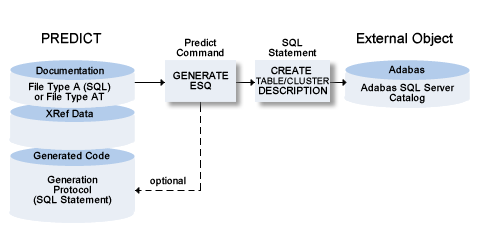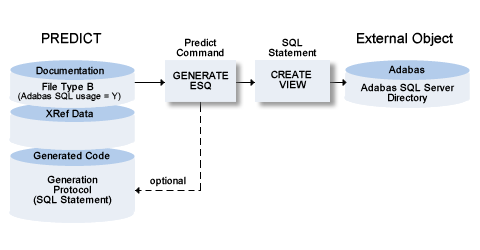This function is used to create table descriptions, cluster descriptions or views in an Adabas SQL Server catalog.
| Predict Object(s) | Generated Command | Result |
|---|---|---|
| One Adabas file corresponding to one SQL table | CREATE TABLE DESCRIPTION | Adds a description of a table in an Adabas SQL Server catalog without creating an Adabas file. |
| One AT file corresponding to one SQL table | ||
| Multiple AT files corresponding to multiple SQL tables | CREATE CLUSTER DESCRIPTION | Adds description of several base tables containing multiple value fields or periodic groups with variable occurrences in Adabas SQL Server. |

From files of type B, a CREATE VIEW statement is generated.

See also section Adabas SQL Server in the Predict and Other Systems documentation.
This document covers the following topics:
Display the Generate Adabas table/view
screen with function code G and object code EQ in a Predict main menu, or with
the command GENERATE ESQ.
09:33:43 ***** P R E D I C T ***** 2007-05-31
Plan 0 - Generate Adabas table/view -
Current VM ................. HOME
File ID .................... *
Contained in DA ............ *
Add table / view ........... Y (Y,N) Use Vista access-nr ..* Y
Replace table / view ....... N (Y,N)
Drop table / view cascade .. N (Y,N)
List SQL statements ........ Y (Y,N)
Protocol saved in member ... *
in library .. ASQLIB
Command ===>
Enter-PF1---PF2---PF3---PF4---PF5---PF6---PF7---PF8---PF9---PF10--PF11--PF12---
Help Next Stop Last LnkEl Flip Print Impl AdmFi SelFi Prof Main
|
Values for fields which have been locked by your data dictionary administrator cannot be overwritten. These fields are skipped when positioning the cursor with the TAB key. See Generation Defaults.
| Presettings | |||||||
|---|---|---|---|---|---|---|---|
| The parameters below can be changed in the Modify Adabas Table/View Defaults screen. See Generation Defaults. | |||||||
| Specification DB ID |
|
||||||
| Count of saved actions | Number (0-99) of generation actions which are stored in the protocol specified under Protocol saved in member/library. If 99 is entered, all generation actions are stored. This is the default setting at installation. | ||||||
| Parameters | |||||||
| Current VM | Adabas tables/views can only be generated from Predict file objects contained in databases of type local linked to the Current VM or contained in databases accessible via the network containing the Current VM. This is a read-only field. | ||||||
| File ID |
ID of the Predict file object from which the definitions are to be generated. To generate an Adabas table, the file must be of
To generate an Adabas view, the file must be of type B. To generate an Adabas cluster, the file must be of type AT. Enter only one file from the cluster; all files in the cluster will be used for generation. |
||||||
| Contained in DA |
Only applicable to tables. Depending on the setting of Specification DB ID in the Modify Adabas table/view defaults screen, entry of a Database ID is mandatory or optional for Adabas files and userviews. If a database is specified, its file list must contain the specified file and the Database type must be compatible with the database type specified for this database number within the Natural Parameter Module (via NTDB macro). Enter an asterisk to display a list of databases for selection. |
||||||
| Use Vista access-nr |
|
||||||
| Add table/view |
|
||||||
| Replace table/view |
|
||||||
| Drop table/view cascade |
|
||||||
| List SQL statements |
|
||||||
| Protocol saved in member |
SQL statements generated for the implementation of the database can be saved in a Natural source member (protocol) on the FDIC file. A member name for the protocol is only required when the Adabas table/view is generated for the first time. SQL statements generated in subsequent generation runs are concatenated to the protocol. The protocol can be displayed using the Display function of the Administration Implemented File menu. |
||||||
| Protocol saved in library | Library where the protocol is to be saved.
Note: |
||||||
If using Predict with Vista distributed data processing, we recommend the following:
Always enter a Vista access number for Adabas files (Add, Modify file).
Set the parameter Specification DB ID in the Modify Adabas table/view defaults to N (database ID may be specified but is not mandatory). If this parameter is set to Y, the user is forced to enter a database ID when generating an Adabas table/view from an Adabas file.
Set the parameter Use Vista access-nr in the Modify Adabas table/view defaults screen to T, but do not protect the field.
If you do not want to use Vista:
Set the parameter Use Vista access-nr in the Modify Adabas table/view defaults screen to N and deactivate the option by blanking out the preceding X.
The table below illustrates the use of the parameter Use Vista access-nr.
| Specification DB ID | Use Vista Access Number | Result if Database ID is specified |
|---|---|---|
| Y | N, Y, T | [1] If the file is Simple in this database and the Adabas attribute Vista access only is not set to Y: the Adabas table/view is generated with the physical database number and physical file number. |
| Y | N |
[2] If the file is defined as partitioned in this database or the Adabas attribute Vista access only=Y: the system checks whether a Vista element for this file and database exists. If exactly one element exists, the Adabas table is generated with the logical Vista number defined in this Vista element. If the Vista numbers are used, the CREATE TABLE DESCRIPTION statement is appended by "MODIFICATION NOT ALLOWED" and has the result that an ALTER statement for this table is rejected in Adabas. If more than one Vista element is found, no Adabas table is generated and an error message is given. |
| Y | T,Y |
Same as above, except that if several Vista elements exist for the file and database, the system checks whether the Vista access number of the file is identical to the Vista file number of one of these Vista elements. If identical, the Adabas table is generated. If not, no Adabas table is generated and an error message is given. If the Vista numbers are used, the CREATE TABLE DESCRIPTION statement is appended by "MODIFICATION NOT ALLOWED" and has the result that an ALTER statement for this table is rejected in Adabas. |
| N | Y |
If the file does not contain Vista access numbers, an error message is given. If the file does contain Vista access numbers, an Adabas table is generated with the access number taken from the file. If the Vista numbers are used, the CREATE TABLE DESCRIPTION statement is appended by "MODIFICATION NOT ALLOWED" and has the result that an ALTER statement for this table is rejected in Adabas. |
| N | Y |
If the file does not contain Vista access numbers, an error message is given. If the file does contain Vista access numbers, the system tests whether Vista elements with the same numbers exist for this file. If so, an Adabas table is generated with this access number. If the Vista numbers are used, the CREATE TABLE DESCRIPTION statement is appended by "MODIFICATION NOT ALLOWED" and has the result that an ALTER statement for this table is rejected in Adabas. |
| N | Y |
If the file does not contain Vista access numbers, an error message is given. If the file does contain Vista access numbers, the system tests whether a Vista element with the same number exists for this file. If so, an Adabas table is generated with this access number. If the Vista numbers are used, the CREATE TABLE DESCRIPTION statement is appended by "MODIFICATION NOT ALLOWED" and has the result that an ALTER statement for this table is rejected in Adabas. |
Command: GENERATE ESQ
Enter parameters on next line in positional or keyword form. File ID is obligatory, all other parameters are optional. If a parameter is not specified, the default value is taken.
| Field | Keyword | Position |
|---|---|---|
| File ID | FILE-ID | 1 |
| Database ID | DATABASE-ID | 2 |
| Add table/view | ADD-TABLE | 3 |
| Replace table/view | REPLACE | 4 |
| Drop table/view cascade | CASCADE | 5 |
| List Adabas statement | LIST | 6 |
| Protocol saved in member | MEM | 7 |
| Protocol saved in library | LIB | 8 |
| Use Vista access-nr | USE-ACCESS-NR | 9 |